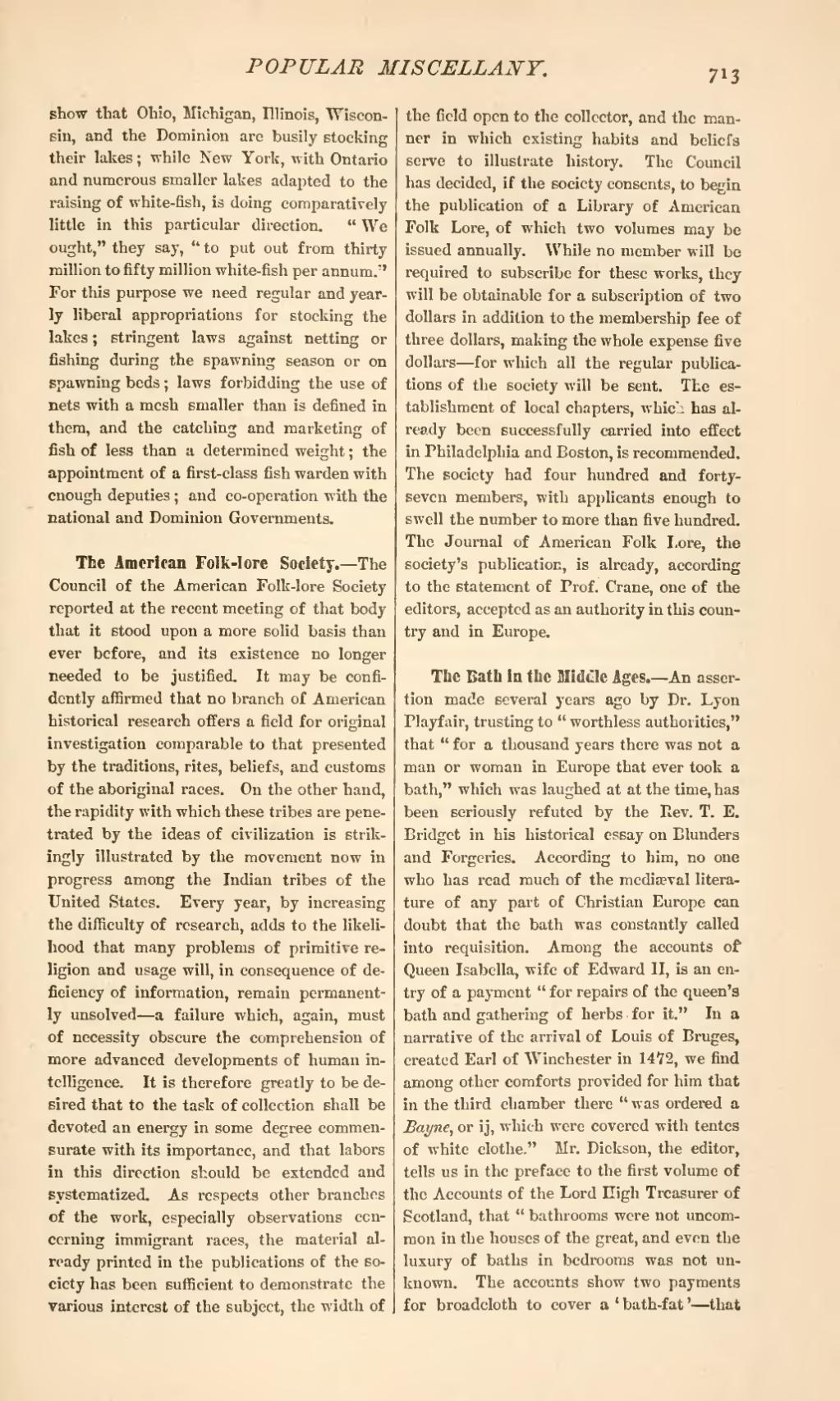show that Ohio, Michigan, Illinois, Wisconsin, and the Dominion are busily stocking their lakes; while New York, with Ontario and numerous smaller lakes adapted to the raising of white-fish, is doing comparatively little in this particular direction. "We ought," they say, "to put out from thirty million to fifty million white-fish per annum." For this purpose we need regular and yearly liberal appropriations for stocking the lakes; stringent laws against netting or fishing during the spawning season or on spawning beds; laws forbidding the use of nets with a mesh smaller than is defined in them, and the catching and marketing of fish of less than a determined weight; the appointment of a first-class fish warden with enough deputies; and co-operation with the national and Dominion Governments.
The American Folk-lore Society.—The Council of the American Folk-lore Society reported at the recent meeting of that body that it stood upon a more solid basis than ever before, and its existence no longer needed to be justified. It may be confidently affirmed that no branch of American historical research offers a field for original investigation comparable to that presented by the traditions, rites, beliefs, and customs of the aboriginal races. On the other hand, the rapidity with which these tribes are penetrated by the ideas of civilization is strikingly illustrated by the movement now in progress among the Indian tribes of the United States. Every year, by increasing the difficulty of research, adds to the likelihood that many problems of primitive religion and usage will, in consequence of deficiency of information, remain permanently unsolved—a failure which, again, must of necessity obscure the comprehension of more advanced developments of human intelligence. It is therefore greatly to be desired that to the task of collection shall be devoted an energy in some degree commensurate with its importance, and that labors in this direction should be extended and systematized. As respects other branches of the work, especially observations concerning immigrant races, the material already printed in the publications of the society has been sufficient to demonstrate the various interest of the subject, the width of the field open to the collector, and the manner in which existing habits and beliefs serve to illustrate history. The Council has decided, if the society consents, to begin the publication of a Library of American Folk Lore, of which two volumes may be issued annually. While no member will be required to subscribe for these works, they will be obtainable for a subscription of two dollars in addition to the membership fee of three dollars, making the whole expense five dollars—for which all the regular publications of the society will be sent. The establishment of local chapters, which has already been successfully carried into effect in Philadelphia and Boston, is recommended. The society had four hundred and fortyseven members, with applicants enough to swell the number to more than five hundred. The Journal of American Folk Lore, the society's publication, is already, according to the statement of Prof. Crane, one of the editors, accepted as an authority in this country and in Europe.
The Bath in the Middle Ages.—An assertion made several years ago by Dr. Lyon Playfair, trusting to "worthless authorities," that "for a thousand years there was not a man or woman in Europe that ever took a bath," which was laughed at at the time, has been seriously refuted by the Rev. T. E. Bridget in his historical essay on Blunders and Forgeries. According to him, no one who has read much of the mediæval literature of any part of Christian Europe can doubt that the bath was constantly called into requisition. Among the accounts of Queen Isabella, wife of Edward II, is an entry of a payment "for repairs of the queen's bath and gathering of herbs for it." In a narrative of the arrival of Louis of Bruges, created Earl of Winchester in 1472, we find among other comforts provided for him that in the third chamber there "was ordered a Bayne, or ij, which were covered with tentes of white clothe." Mr. Dickson, the editor, tells us in the preface to the first volume of the Accounts of the Lord High Treasurer of Scotland, that "bathrooms were not uncommon in the houses of the great, and even the luxury of baths in bedrooms was not unknown. The accounts show two payments for broadcloth to cover a 'bath-fat' that

